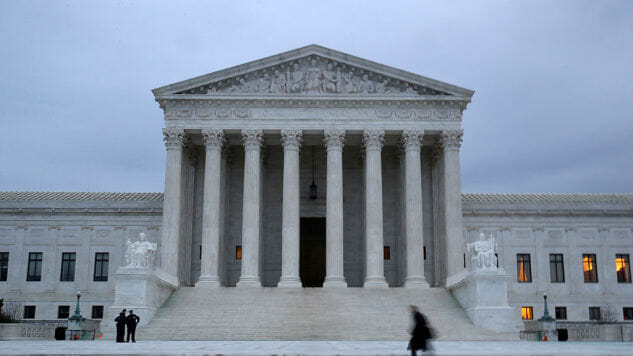Supreme Court Issues Temporary Ruling on Travel Ban
What will the court decide?
Mark Wilson / Getty Politics Features Supreme Coury
According to the Post, the Supreme Court is allowing “broad enforcement” of the “travel ban — at least for a day.”
Per the Post:
U.S. officials can at least temporarily continue to block refugees with formal assurances from resettlement agencies from entering the United States after the Supreme Court intervened again Monday to save a piece of President Trump’s travel ban. … The Supreme Court’s decision came not long after the Justice Department asked the justices to act. That filing, by Acting Solicitor General Jeffrey B. Wall, demonstrated the lengths to which the government is willing to go to impose its desired version of the ban, even before the high court takes up in earnest next month whether the measure is lawful at its core. At issue is whether the president can block a group of about 24,000 refugees with assurances from entering the United States after the Supreme Court decided in June to permit a limited version of his travel ban to take effect.
To be clear, that means the Supreme Court is allowing the Trump White House to limit refugees from six primarily countries (those who have no family ties) from entering America. For the moment, it is temporary—Justice Kennedy’s ruling does not establish a new precedent, but prevents a Ninth Circuit Court of Appeals ruling that allows more refugees in.
Per NPR:
The action comes after an emergency request to set aside the appeals court ruling from the Trump administration which is seeking to enact the broadest travel ban possible before the full Supreme Court hears arguments on its constitutionality on October 10. The appeals court also had ruled that grandparents and other relatives of people already living in the U.S. cannot be barred entrance under the president’s travel ban. Lawyers for the Justice Department did not challenge that part of the ruling. Kennedy’s ruling Monday is the latest in the see-saw legal battle over the Trump administration’s effort to block entry to travelers and refugees from Iran, Libya, Somalia, Sudan, Syria and Yemen.
The limited scope of the ruling does not signal a clear victory for the White House, but it does muddy the waters of the immigration debate considerably
Per USA Today, the Court said that:
“the government does not offer a persuasive explanation for why a mother-in-law is clearly a bona fide relationship, in the Supreme Court’s prior reasoning, but a grandparent, grandchild, aunt, uncle, niece, nephew, or cousin is not.” In its request regarding refugees Monday, the Justice Department dropped its objections to that part of the lower court ruling, noting the Supreme Court had favored the expanded list of relatives.
Future rulings will determine the exact shape and scope of the travel ban, or if it holds at all. Our borders, like our laws, are dependent on the goodwill of women and men—and on the wisdom to see what simple humanity demands.